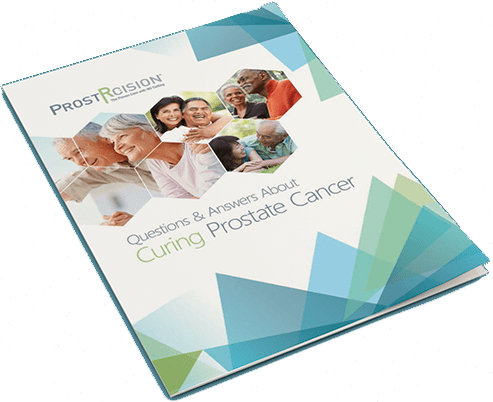When first diagnosed with prostate cancer, you may be curious about which questions are the most important to ask your urologist. It’s important that you have a few questions in mind as you attend those initial visits to understand your diagnosis completely and treatment options available. Here are some questions to consider asking your urologist about prostate cancer to help form a path for the journey ahead.
It’s a common question that many patients have. As you work through your diagnosis, you’ll want to be sure that the urologist, surgeon, or radiation oncologist handling your diagnosis has the experience you deserve. Our radiation oncologists all have over ten years of experience treating prostate cancer, some over 20, and RCOG has treated more than 16,000 prostate cancer patients with ProstRcision.
If your urologist is recommending surgery, a radical prostatectomy, ask him/her how many procedures he/she has performed. Problems with incontinence and sexual function are linked to the experience and skill of the surgeon performing the radical prostatectomy.
ProstRcision has high documented disease-free survival rates using the strictest definition (PSA < 0.2 ng/ml, 10 years after treatment). Equally important, this unique approach to eradicating prostate cancer preserves sexual function and maintains urinary control for the vast majority of men. The documented 10-year and 15-year high disease-free survival rates, combined with no cutting of the prostate, and very few side effects are why over 16,000 men from all 50 states, and over 40 countries have chosen ProstRcision.
Having access to valuable data of previous prostate cancer patients provides a helpful resource to physicians and patients seeking treatment. Our clinics’ computerized prostate cancer database has medical information from more than 16,000 men we have treated over the past 30 years. From pretreatment information like biopsy reports, including Gleason scores, PSA, disease stage, etc., to radiation doses and after-treatment follow-ups, the database allows us to analyze a man’s particular case of cancer and calculate the chance of cure. The value of this database is incredible because it serves as the key to the prostate cancer program.
Different physicians will give different answers to this question, so it’s important to get second and third opinions. Some urologists will recommend the treatment they perform. You want a treatment that will give you the best chance of achieving and maintaining a near zero PSA, 10 years after treatment. Consider consulting both a urologist and radiation oncologist. It could also be helpful to search “prostate cancer treatment” online, read medical research papers from peer-reviewed medical journals, and speak with contacts who have been treated for prostate cancer (We can connect you with past ProstRcision prostate cancer patients who can answer your questions). If you’d like to learn more about the ProstRcision treatment option, request our free booklet.
There are many factors that will determine which prostate cancer treatment option is right for you. In some instances, your urologist or radiation oncologist may choose to observe your prostate cancer before starting any treatment plan. Radiation, cryotherapy, chemotherapy, immunotherapy, targeted therapy, and surgery could all be potential options for treatment moving forward. Your urologist or radiation oncologist will discuss your options and take in your full medical history before selecting the best plan for you.
Once men reach a certain age, they may become more concerned about their overall health and their risk for certain conditions. Prostate cancer impacts 1 in 8 men at some point in their lifetime, and so you may be curious to learn if you can make lifestyle changes that may minimize your risk. Age is the number one risk factor for developing prostate cancer, which is out of our control. But there could be other things you can do to keep your risk lower even as you age. While researchers don’t completely understand the correlation between diet and prostate cancer, some studies suggest that creating healthy eating habits may help. For instance, it is suggested to avoid large amounts of trans and saturated fats and more on healthy fats such as omega-3 fatty acids. Exercise may also reduce your risk of getting certain cancers. You should also tell your physician if anyone in your family was also diagnosed with prostate cancer.
Choosing a treatment option for prostate cancer is a decision between you and your medical team. Different treatment options fail or succeed for different men. It is important to find a urologist and/or radiation oncologist who looks to a patient as an individual, instead of one of many. There are many types of treatment options out there, and a urologist may be more likely to suggest the particular treatment they work with the most. However, you can also ask to learn about other types of treatments so you can make the most informed decision moving forward.
If you’re in the process of choosing the right prostate cancer treatment, our team can help. We offer a free booklet about prostate cancer treatment and you can also talk with a team member who can answer questions and assist in scheduling a consultation with one of our radiation oncologists.
You should also feel comfortable talking to the urologist who gave you a diagnosis. If you’re not getting answers, or they’re talking in a way that’s not easy to understand, consider getting a second opinion.

Make an informed prostate cancer treatment decision. Our 40-page, comprehensive guidebook provides answers to our most frequently asked questions from men diagnosed with prostate cancer, and compares various treatment methods, cure rates and side effects. Our team can also connect you with one of our oncologists at no cost.
Quickly and efficiently build the materials you need to support your inbound marketing strategy. Drag and drop building blocks including testimonials, forms, calls-to-action, and more.